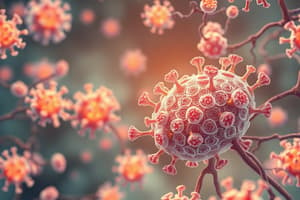Podcast
Questions and Answers
What distinguishes acquired immunity from innate immunity?
What distinguishes acquired immunity from innate immunity?
- Acquired immunity is always present at birth.
- Acquired immunity develops after exposure to antigens. (correct)
- Innate immunity consists only of antibodies.
- Innate immunity has a higher specificity than acquired immunity.
Which of the following attributes is NOT characteristic of adaptive immunity?
Which of the following attributes is NOT characteristic of adaptive immunity?
- Antigenic specificity
- Universal reactivity (correct)
- Diversity
- Immunologic memory
What is the primary immune response mediated by?
What is the primary immune response mediated by?
- Plasma cells
- Helper T cells
- Memory lymphocytes
- Naive lymphocytes (correct)
How does immunologic memory enhance the immune response upon second exposure to an antigen?
How does immunologic memory enhance the immune response upon second exposure to an antigen?
What is an example of passive immunity?
What is an example of passive immunity?
Which statement about the secondary immune response is true?
Which statement about the secondary immune response is true?
In acquired immunity, what role do antibodies primarily play?
In acquired immunity, what role do antibodies primarily play?
What is the significance of the immune system's ability to distinguish self from non-self?
What is the significance of the immune system's ability to distinguish self from non-self?
What distinguishes active immunity from passive immunity?
What distinguishes active immunity from passive immunity?
Which of the following correctly describes natural passive immunity?
Which of the following correctly describes natural passive immunity?
What is the role of herd immunity in a population?
What is the role of herd immunity in a population?
In what scenario would artificial passive immunity be utilized?
In what scenario would artificial passive immunity be utilized?
Which type of immunity is created by exposure to specific infectious agents through vaccination?
Which type of immunity is created by exposure to specific infectious agents through vaccination?
How does humoral immunity function in the immune system?
How does humoral immunity function in the immune system?
What is the defining characteristic of artificial immunity?
What is the defining characteristic of artificial immunity?
What memory capability is associated with passive immunity?
What memory capability is associated with passive immunity?
Flashcards
Self/Non-self Recognition
Self/Non-self Recognition
The ability of the immune system to distinguish between self (body's own cells) and non-self (foreign substances) antigens.
Active Immunity
Active Immunity
Immunity acquired through exposure to a pathogen or antigen, leading to the production of antibodies.
Passive Immunity
Passive Immunity
Immunity acquired through the transfer of pre-formed antibodies from one individual to another.
Natural Active Immunity
Natural Active Immunity
Signup and view all the flashcards
Artificial Active Immunity
Artificial Active Immunity
Signup and view all the flashcards
Natural Passive Immunity
Natural Passive Immunity
Signup and view all the flashcards
Artificial Passive Immunity
Artificial Passive Immunity
Signup and view all the flashcards
Herd Immunity
Herd Immunity
Signup and view all the flashcards
Antigenic Specificity
Antigenic Specificity
Signup and view all the flashcards
Diversity of Immune Responses
Diversity of Immune Responses
Signup and view all the flashcards
Immunological Memory
Immunological Memory
Signup and view all the flashcards
Innate Immunity
Innate Immunity
Signup and view all the flashcards
Primary Immune Response
Primary Immune Response
Signup and view all the flashcards
Secondary Immune Response
Secondary Immune Response
Signup and view all the flashcards
Study Notes
Acquired Immunity
- Also known as adaptive or specific immunity
- Defends the host from infection in a particular way
- Different from innate immunity, which is present from birth
- Acquired after exposure to an antigen
- Either through infection or vaccination (active immunity)
- Or by receiving antibodies or lymphocytes from another source (passive immunity)
- Adaptive immunity has four key characteristics:
Antigenic Specificity
- The immune system protects individuals from harm
- Caused by foreign pathogens or pre-cancerous cells
- The system must distinguish self from non-self to avoid harming the body
- It can differentiate between billions of different antigens
- Antibodies are crucial in distinguishing minute differences in protein structures
Diversity
- Immune responses are specialized and designed to combat various types of microbes
Immunological Memory
- Once the immune system encounters an antigen, it develops a “memory”
- Subsequent exposure to the same antigen triggers a stronger and faster response (secondary response)
- Unlike the initial response (primary response)
- This memory helps provide long-lasting immunity to many infections
Immunologic Memory
- Leads to faster and more intense secondary immune response
- Memory lymphocytes, long-lived cells formed during the primary response, are crucial for this response
- Optimizes the ability to fight recurrent infections
- Ensures a faster and improved response to later encounters with the same antigen
Vaccines
- Memory is a core function of vaccines
- Providing long-lasting protection against infections
Self/Non-Self Recognition
- The immune system mainly targets foreign antigens
- This indicates a capability for self/non-self recognition
- It helps distinguish between the body's own cells (self) and foreign substances (non-self)
Types of Acquired Immunity
- Active Immunity:
- Develops after exposure to an antigen
- Takes time and is long-lasting
- Creates an immunological memory
- Passive Immunity:
- Results from receiving pre-formed antibodies
- Acts immediately but is temporary
- Does not create immunological memory
Active Immunity Subtypes
- Natural Active Immunity: Exposure to a disease agent triggers the body's immune response
- Artificial Active Immunity: Immunization with a vaccine stimulates the production of antibodies
Passive Immunity Subtypes
- Natural Passive Immunity: Antibodies move from mother to baby (e.g., through breast milk), providing temporary protection
- Artificial Passive Immunity: Receiving antibodies from an external source (e.g., antiserum) offers short-term protection
Herd Immunity
- A type of indirect protection from infectious diseases
- Occurs when a substantial portion of a population is immune, limiting the spread of infection among susceptible individuals
Humoral Immunity
- Involves antibodies produced by B lymphocytes
- Used to combat pathogens
- Antibody production occurs after antigen recognition by B-cells
Cell-Mediated Immunity
- Involves T-cells, other immune cells (NK), and phagocytes
- A crucial defense mechanism against diverse pathogens
- Functions include targeting infections, cancers and participating in transplant rejection
Studying That Suits You
Use AI to generate personalized quizzes and flashcards to suit your learning preferences.



